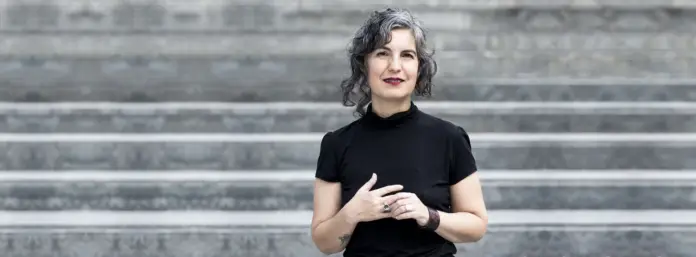“Many people don’t know that glaciers are disappearing in Mexico, or that there are tropical glaciers that are dying,” worries the writer, editor and manager, Monica Nepote.
In recent years, her topics have been about hydrography and relief, “there is not a day when I don’t think about water: I teach classes and my students deal with water issues and wherever you look, the topic appears, which has spread as a social concern.”
“I was late to the concern, but thank goodness. It is urgent to think about water, about forests, about the climate crisis, about the changes that it implies,” she considers.
While talking about the mountains and glaciers, the writer addresses the maternal legacy, the relationship between literature and geography and their anchoring to the body, ecofeminist approaches as well as the ways in which violence and force can be contrasted “…or intertwined,” she notes and remains cautiously silent before continuing, “I try to be careful in how I weave this idea, but violence is part of life and with this I do not want to normalize it.”
Mónica Nepote emphasizes that it is important for her to phrase the idea well because it does not mean that we should accept certain forms of violence that are the result of social decomposition.
“When I talk about violence I mean a river. Yesterday, talking to a friend, she told me that she had found out that the son of a friend of hers had died in a river, just like that, he was a child,” she elaborates on what she considers to be part of life.
“My mother was a very strong person. She was also a violent person. The same force that sustained her made her very stubborn, a personality with whom it was very difficult to negotiate,” she remembers.
From her memoirs, fighting with her mother was like fighting a river.
Last November she gave a talk at El Colegio Nacional about rivers, channels and other water formations that run through her literature, and she says she will soon publish that text in a book.
-How have you accompanied your writing about water?
“I am very interested in writing and the environment or rather I have been uniting my environmental concerns with writing for some time now. It is a long story – and it has to do with something that is not told in this text, but is told in another – but for me the mountain for many years was an unknown space, a few years ago I began to go and I began to climb the mountain, so that brought me closer to a language, to look for things that I was not understanding. Just as I went to what we call nature, I stood before a river or in a forest and I knew nothing. I could not recognize trees, name topographical features,” she says.
From asking herself why she didn’t have words to name that, the writer began to see the “mother” and the learning processes behind those forests, mountains and rivers.
“An entity from which I learn just as I learned things from my mother, not because she told me to sit up straight or comb my hair, but because in her other ways of living and clinging to life and reinventing herself, she became a kind of teacher,” she explains.
-You talk a lot about your intimacy and you distance yourself from the theoretical, what kind of space is writing for you?
“I am a terrible reader of stories and a keen reader of theory, so I am glad that my writing does not appear in a theoretical form, because I am not an academic and I am in the spectrum of creative literature. As language moves me, it is this autobiographical bias, I always say that I had never done a striptease as badass as this text. It must also be taken into account that when Gabriela Jaúregui invited me to write that text, my mother had not just passed away, but I was in the process of mourning and that touched me,” explains Mónica Nepote.
-Do you consider it a space for exhibition?
“A zone of vulnerability. I really like autofiction and I celebrate that in recent years we have had more openness towards these writings and we have had it because there are many women who do it,” she says.
All these are some of the themes addressed in her text “Our stories are tributaries around a word that becomes a river,” one of the 13 that make up the anthology of essays Tsunami 3 (Sexto Piso, 2024).
TSUNAMI 3
This is the third publication of a collection whose first volume was published in 2018 and the second in 2019. It is catalogued by the publisher itself in the “Realidades” section.
The anthology also includes texts by Valeria Angola, Lucía Calderas, Ángeles Cruz, Selene Galindo, Nayeli García, Jessica Marjane, Márgara Millán, Leydy Pech, Yoalli Rodríguez, Alexandra R De Ruiz, Olivia Teroba and Alaíde Ventura.
Source: cronica




